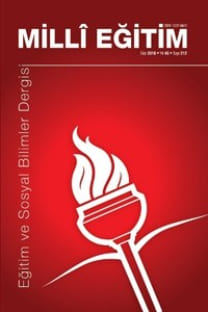PEDAGOJİK-ANALOJİK MODELLERİN İŞ-GÜÇ-ENERJİ KONUSU İLE İLGİLİ KAVRAMLARI ANLAMAYA ETKİSİ
Araştırmanın amacı, pedagojik-analojik modellerin kullanımının,öğrencilerin iş-güç-enerji konusunu kavramalarına olan etkisini araştırmak vegeleneksel ders anlatım yöntemi ile karşılaştırmaktır. Bu amaç doğrultusundaiş, güç, enerji konusunda çeşitli pedagojik-analojik modeller geliştirilmiş ve iş,güç, enerji konusunu anlamaya olan etkisi incelenmiştir. Çalışmanın örneklemini, Konya Meram Muhittin Güzelkılınç Lisesi’ nin iki farklı şubesindeki toplam53 10. sınıf öğrencisi oluşturmaktadır. Şubelerden biri pedagojik- analojikmodellerden olan animasyonların ve analojilerin kullanılacağı deney grubu,diğeri ise geleneksel öğretim yöntemlerinin kullanılacağı kontrol grubu olarakseçilmiştir. Araştırmada deneysel araştırma yönteminin öntest-sontest desenikullanılmıştır. 2006–2007 öğretim yılının ikinci döneminde dört hafta süreyleuygulama yapılmıştır Araştırmada veri toplamak amacıyla iş-güç-enerji konusu ile ilgili bir kavram başarı testi ve yazılı cevap gerektiren bir test geliştirilmiştir. Hazırlanan kavram başarı testinin kapsam geçerliliği, yapı geçerliliği, güvenilirliği incelenmiş ve test maddelerinin analizi yapılmıştır. Pilot çalışma verilerine göre testin Cronbach Alfa güvenilirlik katsayısı 0,927, KR–20 güvenilirlik katsayısı ise 0,921 bulunmuştur. Kavram başarı testinden elde edilen veriler bağımsız grup t testi ile analiz edilmiştir. Sonuçlar modellerin kullanıldığı grup lehinde anlamlı çıkmıştır. Yazılı cevap gerektiren test yardımıyla nitel anlamda veri toplanmış ve öğrencilerin getirdikleri açıklamalar karşılaştırılmıştır.
Anahtar Kelimeler:
Pedagojik-analojik modeller, iş-güç-enerji, animasyonlar, analojiler
THE EFFECT OF USING PEDAGOGICAL-ANALOGICAL MODELS TO UNDERSTANDING THE WORK-POWER-ENERGY CONCEPTS
Aim of this study is to compare the effect of using pedagogical- analogical models to understanding the work- power- energy concepts of the students. Because of this aim, in this study, various pedagogical- analogical models were developed and effectiveness of these tools on understanding work- powerenergy and subject were investigated. Sample of this study consisted 53 students of tenth class read at Konya Meram Muhittin Güzelkılınç High School’ s two class. One of this classes was selected as experimental group that was used animations and analogies. Other group was selected as control group that was used traditional methods. In the study, the pretest- posttest design of experimental investigation method was used. Applications of the lessons were carried out throughout 4 weeks at second semester of 2006- 2007 education year. For collecting the data, a concept achievement test and a written answer test were developed. In this way, both quantitative data and qualitative data were collected. Content validity, factoral validity, reliability of the concept achievement test and items of test were analysed. According to data of pilot study, cronbach alfa reliability coefficient was 0,927; KR- 20 reliability coefficient was 0,921. Data of concept achievement test were analysed by way of independent group t test. The results were meaningful in favour of experiment group on whıch pedagogical- analogical models were used. Qualitative data were collected by way of the written answer test and explanations of the students at two groups were compared
Keywords:
Pedagogical-analogical models, work- power- energy, animations, analogies.,
- ISSN: 1302-5600
- Yayın Aralığı: Yılda 4 Sayı
- Başlangıç: 1973
- Yayıncı: Milli Eğitim Bakanlığı
Sayıdaki Diğer Makaleler
BAZI GELİŞMİŞ ÜLKELERDE TEKNOLOJİ EĞİTİMİ VE TÜRKİYE İÇİN ÖNERİLER
S Nihat ŞAD, Sabahattin ARIBAŞ
ORTAÖĞRETİM MATEMATİK DERSLERİNDE OYUNLARIN KULLANILABİLİRLİĞİ
Saide ÖZBEY, Fatma ALİSİNANOĞLU
İLKÖĞRETİM OKULLARINDA GÖREVLİ MÜDÜRLERİN İLETİŞİM STİLLERİ
MİLLÎ EĞİTİM BAKANLIĞINDA GÖREVLİ İNGİLİZCE ÖĞRETMENLERİNİN HİZMET İÇİ EĞİTİMİNE İLİŞKİN ÖNERİLER
YENİ TÜRKÇE DERSİ ÖĞRETİM PROGRAMININ UYGULAMASINA İLİŞKİN OLARAK BRANŞ ÖĞRETMENLERİNİN GÖRÜŞLERİ
Fatma SUSAR KIRMIZI, Nevin AKKAYA
YENİ BİR ÖĞRENME YAKLAŞIMI: HARMANLANMIŞ ÖĞRENME
SU DALGALARI KONUSUNUN ÖĞRETİMİNDE İŞBİRLİKLİ ÖĞRENME YÖNTEMİNİN ÖĞRENCİ BAŞARISINA ETKİSİ
